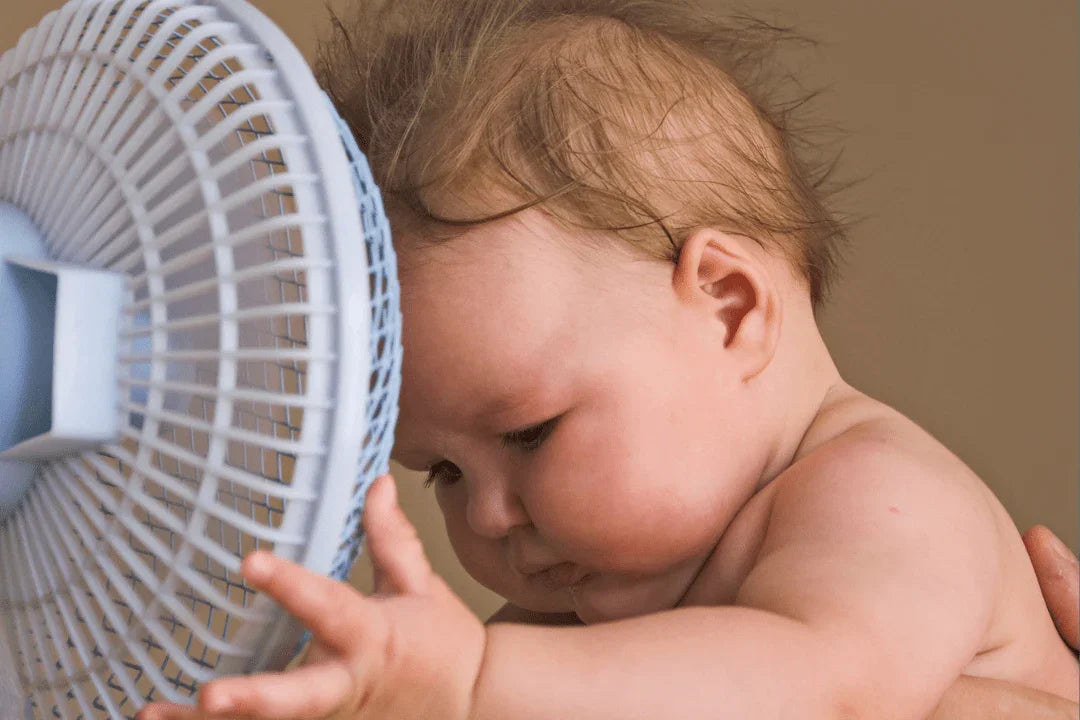If your baby is sleeping more than they usually do, there might be a good reason. A lot of people say that when babies sleep, they grow, but is this true? Do babies sleep more during growth spurts? Or is that an old wives’ tale?
We’ll go over what growth spurts are and whether babies sleep more during growth spurts. Keep reading to learn what signs to look out for and how you can best support your baby when they are going through a period of growth.
Can Growth Spurts Make Babies Sleep More?
Baby sleeping routines can vary significantly from child to child. Some infants are rock star sleepers from the beginning, while some just never are. In either case, it can be unsettling when your child suddenly starts sleeping through regular wake times and routine bottle feedings.
Perhaps you’ve checked a few extra times to make sure they’re still breathing, and that’s okay! But could there be an explanation that can give you some peace of mind? Do babies sleep more during growth spurts? Could it be that your baby might just be growing?
A family member may have told you that babies sleep more during growth spurts, but you’re not sure if you can trust this. What if there’s cause for concern that you might not be aware of? Let’s look at what we know.
What Is a Growth Spurt?
By six months, experts say that most children will double in size from their birth weight. By their first birthday, they’ll triple in size. For example, a baby weighing seven pounds at birth will be 14 pounds by six months old and 21 pounds by a year old.
Parents and professionals knew that infants grew significantly within the first year and that occasional sleep changes seemed to be followed by babies growing bigger. In 2011 this theory was tested.
Researchers discovered that after increased hours of sleep and increased caloric intake, infants had experienced measurable growth. Sometimes this was in as little as two days. These results came in repeatedly for the babies in the study, though every baby’s sleep pattern differed.
What this study proved is what parents have been saying for generations. Babies go through many periods of intense growth or growth spurts, and babies sleep more during growth spurts.
What Happens During a Growth Spurt?
The first year of an infant’s life comes with many intense and demanding changes, both on the parents and the child. Just when you feel like you’re getting to know this little person, suddenly they’re different! A baby growth spurt might be the cause for these changes.
One morning you pick up your little one from their crib, and they feel like they weigh more. Perhaps your baby is suddenly more aware of their surroundings and has a more challenging time sleeping at night. These things could all be the result of intense physical or mental growth.
During deep sleep, both infant bodies and brains grow. This fact probably explains why babies sleep more during growth spurts. We know sleep releases human growth hormone. Whether it’s the body or development in the brain, actual growth causes the body to use more energy. As a result, babies eat and sleep more. We don’t know why, but this happens in short periods, over and over again.
When Do Babies Undergo Growth Spurts?
If an older child or adult is tired, they have the language to say, “I’m tired.” If a baby needs extra rest, they may not be able to express it. It can be hard to tell what your baby needs or how to help them if you don’t know what’s going on. It can help to know when growth spurts happen.
As a general guideline, experts agree that there are specific periods when babies are most likely to experience a growth spurt. These periods are:
- Between two and three weeks old
- Between four and six weeks old
- Between six and eight weeks old
- At around three months old
- At about six months old
- At about nine months old
Growth spurts tend to last anywhere from two days to a week. When you know what periods your baby might go through a growth spurt, you can prepare to support them. Because babies sleep more during growth spurts, don’t be surprised if their sleep increases during these times.
Babies Need Good Sleep To Grow
We’ve established what growth spurts are and the fact that babies sleep more during growth spurts. Now let’s look at some more information that will help you understand what to look out for and how you can support your baby during this time.
Understanding Infant Sleep
While adults only need between seven and nine hours of sleep a night to be healthy, newborns need between 14 and 17 inside 24 hours. Once out of the newborn phase, babies need between 12 and 15 hours of sleep inside 24 hours.
Doctors don’t like to suggest sleep routines for newborns because they need sleep so much and are adjusting to a new world. Your baby may start to settle into a routine after four months of age. The routine will probably look like 10 to 12 hours of sleep overnight, with two to three naps daily equaling around two to four hours combined.
While babies sleep more during growth spurts, their sleep routine may change, especially at night. They may have a hard time going to sleep. If your baby usually sleeps through the night, you may find them waking up every hour. Don’t be alarmed.
Often, babies will make up the nighttime sleep they lost during the day with an extra-long nap or two. For this reason, it’s essential to look at infant sleep within 24 hours and not just overnight. If your baby is typically making up the sleep they lost during the night with naps the following day, their bodies are doing what is healthy for them.
Other Signs of a Growth Spurt
If you are wondering if your baby is sleeping more because of a growth spurt, there are some other signs that you can look out for. We’ll go over each of them.
Increased Appetite
During times of intense growth, your baby may seem fussy between feedings. Often, an extra ounce or two will do the trick. Little ones can wake multiple times in the night just to feed. Breastfed babies cluster feed during growth spurts, sometimes hourly.
Growth
Don’t be surprised if your milk monster looks like they’ve grown overnight— they probably have! They may look rounder, or their footed sleepers may suddenly be too short. The 2011 study showed that infants showed measurable growth in as little as two days. Keep an eye out for clothing and containers that might be getting too small.
Change in Routine
Your baby’s typical feed and sleep schedule may change as they are eating more. However, most babies sleep more during growth spurts, but some sleep less. During a cognitive growth spurt, they may sleep less because your baby can do more things. You may suddenly find them standing in their crib instead of sleeping!
Change in Mood or Behavior
Your calm, easygoing infant may be fussier and cry a lot. A baby who is typically independent may want to be held or near you all the time. While this could be because of hunger, increased mental awareness can also be the cause.
Cognitive development can cause an older baby to be frustrated about ability. It can be overwhelming to be suddenly aware of things you never noticed before! Being aware of all the new things can make babies feel lonely, and they may want to be held more often while they adjust.
How To Support Your Baby During a Growth Spurt
Don’t feel helpless when your baby is going through these changes. There are things you can do to support and help them. When they need more sleep, be attentive to their cues.
To monitor your child's change in mood, or behaviour at night time, see our video baby monitors.
Feed Them When They’re Hungry
Trust babies to eat when they are hungry and sleep when they are tired. Keep track of how much your baby is doing both of these things. You’ll typically find that they are within normal ranges. Of course, if you’re concerned that your baby is sleeping or eating too much, call your pediatrician.
Follow Their Routine, But Be Flexible
Your baby is looking to you for support. Especially as they get older, babies find comfort in knowing what’s going to happen. Follow their routine, but don’t be stressed if they stray from it a little bit. The most important thing is to give your baby what they need during this time.
Be Sensitive
What your baby needs most right now is you. If they cry for you, they probably need your emotional support. Stay in the moment and enjoy all the cuddles. Take in all the memories of watching this little person grow and stay attentive to their cues.
Be Patient
Growth spurts don’t last forever. Keep an eye out for infant hunger to decrease after a few days or a week. Sleep patterns should return to normal. They will become less fussy as they get used to changes in themselves and their world. Your growing baby might drink more milk now or may drop their third nap while lengthening the remaining nap times. You’ll figure it out together!
Take Care of Yourself
During baby growth spurts, it’s just as vital that you are taking care of yourself. Because babies sleep more during growth spurts, take advantage of sleep times and rest. Drink lots of water and eat nourishing food when you can. Please reach out to a professional if you need to.
FAQ
Check out these common questions when it comes to baby growth spurts.
Should I let my baby sleep or wake them for feedings?
The American Academy of Pediatrics recommends waking up infants younger than two weeks to feed if they sleep more than three to four hours. The timing is recommended because weight gain is so crucial during this period. After that, it’s perfectly fine to let your baby sleep until they are ready to wake up.
Is my breastfed baby getting enough breastmilk?
Most like yes. Allow your body a few days to catch up with your baby. Breastfeeding mothers find that a baby growth spurt causes an increase in their supply. If after a few days you are still concerned, contact your doctor or a lactation specialist.
Do babies poop more during a growth spurt?
Growth spurts can cause your baby to demand more milk. Every baby is different in how they respond to this change. They may poop more often or less than once a day as their body adjusts to their growth and more milk intake.
Do baby growth spurts hurt?
There’s no evidence that growing hurts babies. Growth spurts are a natural occurrence, and infant bodies are made to triple in size by the time they reach 12 months. If you feel that your baby is in pain, call your pediatrician.
Should I burp my baby if they fall asleep?
Growing babies might fall asleep, happy to have a full belly of warm milk. Don’t worry about disturbing them. Burping your sleeping baby will help them sleep more comfortably.
Is it a growth spurt or something else?
Babies sleep more during growth spurts, as well as when their immune system is fighting off an illness. It will become evident to you after witnessing it for a few days. Also, growth spurt fussiness can look like teething. However, teething often involves other signs like lots of drooling and white gums.
What if my baby is sleepy because something is wrong?
Look for sleepiness combined with other symptoms, like dry diapers, dark-colored urine, fever, difficulty waking, or listlessness. If you are ever in doubt, call your pediatrician.
So, Do Babies Sleep More During Growth Spurts?
Studies have shown that babies definitely sleep more during growth spurts. You will see this increase over 24 hours, along with other signs like increased appetite and mood changes. Now you have all the information you need to care for your baby during a growth spurt!





